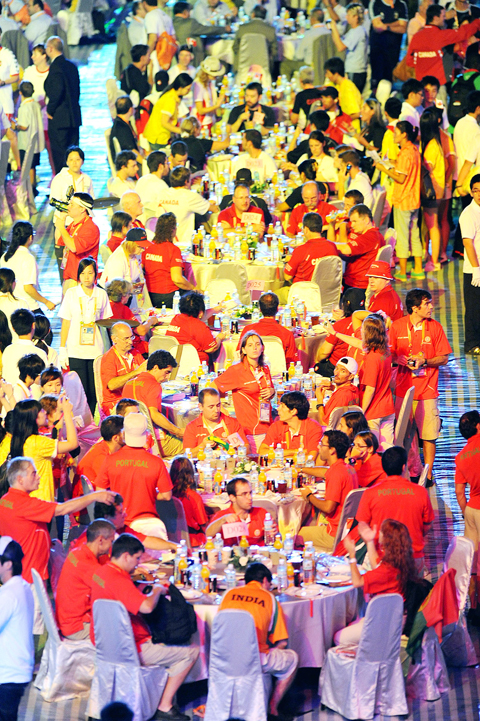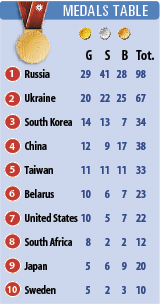Thousands of spectators and athletes gathered at Taipei Municipal Stadium last night to celebrate as the 2009 Summer Deaflympics came to a close.
The Russian Federation bagged the most golds and the most medals at the Games — 29 gold, 41 silver and 28 bronze for a total of 98 medals.
Second and third in terms of gold medals were Ukraine and South Korea, with 20 and 14 medals respectively. Taiwan ranked fifth with 33 medals in total — 11 gold, 11 silver and 11 bronze.

PHOTO: CHANG CHIA-MING, TAIPEI TIMES
The closing festivities included drummers from U Theatre (優人神鼓), the Minghuayuan (明華園) Taiwanese Opera Troupe and Hong Kong singer Aaron Kwok (郭富城).
While watching the performances, athletes enjoyed a banquet of 11 traditional Taiwanese dishes and desserts. Organizers designed the closing ceremony to be unique, and it was the first time a banquet had been held for the celebration.
The dishes included steamed buns, tempura fish cakes, beef noodle soup, minced pork with rice, mango shaved ice, bubble tea and other treats. Each athlete also received pineapple cakes, nougat, coffee-flavored plums and oolong tea to take home.

Spectators in the stands each received a box of snacks and a glowing tambourine during the festivities.
Athletes celebrated the conclusion of the Games by dancing along with the cheerleaders, forming long lines and weaving in and out among the tables.
The Widex Fair Play Award went to Gabor Mathe of Hungary, who won the bronze in the men’s singles tennis.
Mathe took home US$5,000 in prize money. The winner of the award must be under 25 years old or younger and demonstrate sportsmanship, respect and fairness in the Olympic spirit.
The sports director and president of the International Committee of Sports for the Deaf (ICSD) reviews nominations submitted by ICSD technical directors in each sport. The final nominee is selected and presented to the Widex representative for approval.
ICSD president Donalda Ammons also presented Athens as the host city of 2013 Summer Deaflympics.
The Chinese delegation, which did not attend the opening ceremony on Sept. 5, did show up for the closing ceremony. Deputy director of the Chinese Deaflympics team Zhao Su-jing (趙素京) said at a press conference before the closing ceremony that the team still had about 52 competitors and staff in Taipei who would attend.
The Chinese team did not carry the Chinese flag upon entering the stadium, instead holding up a banner reading: “Go, Taiwanese compatriots in the disaster zone.”
China attended neither the opening nor closing ceremonies of the World Games in Kaohsiung in July.
Zhao said China sent 78 athletes to the Games this year.
As they were from different provinces and had to gather in Beijing before coming to Taiwan, the team had not been able to make it to the opening ceremony, she said.
Also See: DEAFLYMPICS TAIPEI 2009: Ukraine wins Taipei soccer gold

SECURITY: As China is ‘reshaping’ Hong Kong’s population, Taiwan must raise the eligibility threshold for applications from Hong Kongers, Chiu Chui-cheng said When Hong Kong and Macau citizens apply for residency in Taiwan, it would be under a new category that includes a “national security observation period,” Mainland Affairs Council (MAC) Minister Chiu Chui-cheng (邱垂正) said yesterday. President William Lai (賴清德) on March 13 announced 17 strategies to counter China’s aggression toward Taiwan, including incorporating national security considerations into the review process for residency applications from Hong Kong and Macau citizens. The situation in Hong Kong is constantly changing, Chiu said to media yesterday on the sidelines of the Taipei Technology Run hosted by the Taipei Neihu Technology Park Development Association. With

CARROT AND STICK: While unrelenting in its military threats, China attracted nearly 40,000 Taiwanese to over 400 business events last year Nearly 40,000 Taiwanese last year joined industry events in China, such as conferences and trade fairs, supported by the Chinese government, a study showed yesterday, as Beijing ramps up a charm offensive toward Taipei alongside military pressure. China has long taken a carrot-and-stick approach to Taiwan, threatening it with the prospect of military action while reaching out to those it believes are amenable to Beijing’s point of view. Taiwanese security officials are wary of what they see as Beijing’s influence campaigns to sway public opinion after Taipei and Beijing gradually resumed travel links halted by the COVID-19 pandemic, but the scale of

A US Marine Corps regiment equipped with Naval Strike Missiles (NSM) is set to participate in the upcoming Balikatan 25 exercise in the Luzon Strait, marking the system’s first-ever deployment in the Philippines. US and Philippine officials have separately confirmed that the Navy Marine Expeditionary Ship Interdiction System (NMESIS) — the mobile launch platform for the Naval Strike Missile — would take part in the joint exercise. The missiles are being deployed to “a strategic first island chain chokepoint” in the waters between Taiwan proper and the Philippines, US-based Naval News reported. “The Luzon Strait and Bashi Channel represent a critical access

Pope Francis is be laid to rest on Saturday after lying in state for three days in St Peter’s Basilica, where the faithful are expected to flock to pay their respects to history’s first Latin American pontiff. The cardinals met yesterday in the Vatican’s synod hall to chart the next steps before a conclave begins to choose Francis’ successor, as condolences poured in from around the world. According to current norms, the conclave must begin between May 5 and 10. The cardinals set the funeral for Saturday at 10am in St Peter’s Square, to be celebrated by the dean of the College